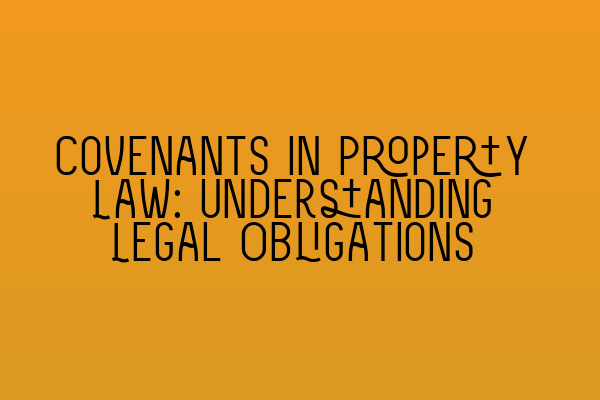Covenants in Property Law: Understanding Legal Obligations
Covenants play a crucial role in property law, ensuring that certain obligations and restrictions are upheld when dealing with real estate transactions. Understanding these legal obligations is essential for property owners, buyers, and sellers alike. In this comprehensive guide, we will explore the concept of covenants in property law, their types, enforcement, and implications.
What are Covenants?
A covenant is a legally binding agreement or promise made between parties in relation to the use or restriction of land. Covenants can be created in a variety of situations, such as when a property is sold, subdivided, or developed. They serve to protect the interests of parties involved and ensure the proper use and enjoyment of the land.
Types of Covenants
There are two main types of covenants: positive covenants and negative covenants.
Positive Covenants:
Positive covenants impose specific obligations on the property owner or occupier, requiring them to take certain actions. Examples include maintaining fences, paying dues to a homeowners’ association, or contributing to the maintenance of shared amenities.
Negative Covenants:
Negative covenants, on the other hand, restrict the property owner or occupier from performing certain actions. These restrictions are designed to protect the value and character of the property and surrounding area. Examples of negative covenants include limitations on building height, prohibiting certain types of activities, or preventing alterations to the property’s exterior.
Enforcing Covenants
Enforcing covenants can be a complex legal process. The methods of enforcement depend on the nature of the covenant and the jurisdiction in which the property is located. In general, enforcement can occur through two main avenues: legal action or equitable remedies.
Legal action involves taking the matter to court, where a judge may issue a monetary penalty or an injunction to compel compliance with the covenant. Equitable remedies focus on granting specific relief to the affected party, such as a court order to stop a prohibited activity or to compel a positive action.
Implications of Covenants
Covenants have significant implications for property owners and potential buyers. It is essential to be aware of any existing covenants when purchasing a property, as they may impose restrictions or obligations that can impact future plans or property use. Failure to comply with covenants can lead to legal consequences and potential disputes with other property owners or residents in the area.
When considering the creation of new covenants, it is crucial to carefully draft the agreement to ensure its enforceability and clarity. Seeking legal advice from a property law expert is highly recommended to navigate through the complexities involved in covenant creation and enforcement.
Conclusion
Covenants form an integral part of property law, serving to protect the rights and interests of property owners and communities. Understanding the different types of covenants, their enforcement, and implications is essential for anyone dealing with real estate transactions. Whether you are buying or selling a property, it is crucial to seek professional legal advice to ensure compliance with existing covenants and to navigate through the intricacies of covenant creation and enforcement.
